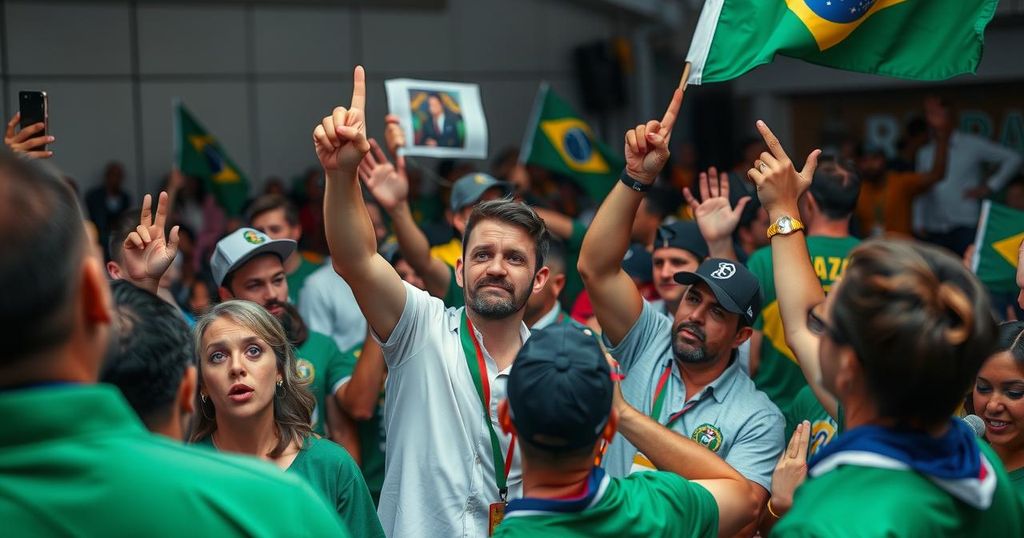Donald Trump’s victory has sparked renewed hopes for Jair Bolsonaro, Brazil’s former president, who is currently banned from office until 2030 due to legal rulings. Bolsonaro’s supporters believe that Trump’s presence in power may enable Bolsonaro to challenge the current government under President Lula da Silva, especially as political tensions rise amid economic difficulties and shifting voter sentiments ahead of the 2026 elections.
The recent election of Donald Trump presents a perspective of renewed optimism for Jair Bolsonaro, the former President of Brazil, who is currently barred from public office until 2030. This situation arises from a ruling by Brazil’s Superior Electoral Court regarding allegations of power abuse related to his disparagement of the country’s electronic voting process. While Bolsonaro is exploring legal avenues to challenge this ruling, he is optimistic that Trump’s presidency may impede the current Brazilian administration and potentially pave the way for his return in 2026.
Bolsonaro’s supporters assert that Trump’s election could create pressures that complicate the operation of President Luiz Inácio Lula da Silva’s government. Eduardo Bolsonaro, a Congressman and the former President’s son, remarked that Trump’s victory extends beyond just a benefit for democracy; he sees it as significant news for global peace. In the lead-up to the election, Lula had aligned himself with the incoming administration’s opposition, stating concerns that Trump’s leadership could reflect authoritarian tendencies. Following Trump’s win, however, Lula attempted to soften his prior remarks, suggesting a shift in approach towards the new administration.
While Lula’s allies quickly condemned Trump’s win, Bolsonaro argued that his return could deepen political divides and distract from pressing societal issues such as healthcare and employment. He referenced Lula’s discussions with BRICS nations about challenging the dollar’s supremacy in global trade, asserting that such maneuvers would negatively impact Brazil’s economy and create hurdles for Lula’s business supporters.
Despite being ineligible, Bolsonaro’s popularity is reportedly on the rise, as signified by hypothetical polling data and returning public support. Contextually, it is crucial to analyze the shifting dynamics of Brazilian electoral politics stoked by America’s recent elections. Serra Bronzina, a political analyst, illustrated the challenges ahead for Lula’s administration, highlighting the potential isolation from the more conservative factions of U.S. politics, particularly with Trump’s electoral triumph.
Given Bolsonaro’s significant support base, the outlook for a future comeback remains speculation, given the aforementioned legal constraints and a shifting political landscape characterized by Lula’s declining popularity and economic turmoil in Brazil. Supporters of Bolsonaro assert their hopes rest on Trump not only winning in the U.S. but using his influence to reshape Brazilian political dynamics ahead of the 2026 elections.
The relationship between Jair Bolsonaro and Donald Trump has been characterized by ideological alignment on numerous conservative issues. Bolsonaro, often dubbed the ‘Trump of the Tropics’, is currently unable to run for office due to a court ruling related to his past conduct as President. This ruling is a key obstacle in his political ambitions, especially in light of growing public dissatisfaction with the current administration under President Lula da Silva. The return of Trump as a significant global leader has sparked discussions among Bolsonaro’s supporters about the potential for political revitalization in Brazil, against the backdrop of Brazil’s economic challenges and growing political polarization.
In conclusion, the intersection of Donald Trump’s re-election and Jair Bolsonaro’s aspirations highlights a complex interplay of political dynamics in Brazil. Despite current legal restrictions, Bolsonaro and his allies remain hopeful that Trump’s presidency will facilitate a pathway for his political re-engagement and subsequent challenges to Lula’s administration. As public sentiment shifts amidst economic challenges, the context underscores a growing need for political recalibration within Brazilian governance ahead of the crucial 2026 elections. Moving forward, both Bolsonaro’s positioning and the impact of U.S. politics will be pivotal as Brazil navigates its path ahead.
Original Source: www.foxnews.com






